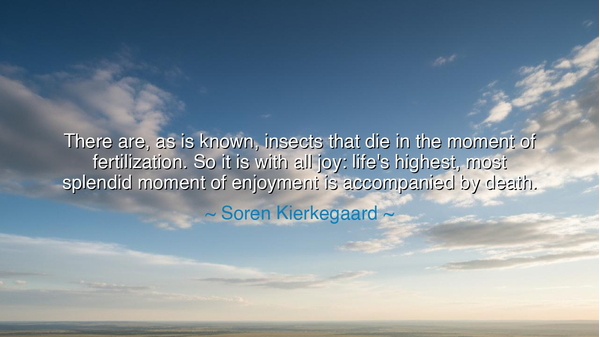
There are, as is known, insects that die in the moment of
There are, as is known, insects that die in the moment of fertilization. So it is with all joy: life's highest, most splendid moment of enjoyment is accompanied by death.






“There are, as is known, insects that die in the moment of fertilization. So it is with all joy: life’s highest, most splendid moment of enjoyment is accompanied by death.”
Thus spoke Søren Kierkegaard, the philosopher of paradox and passion, who wandered the streets of Copenhagen as both poet and prophet of the human soul. In these words, he unveils the tragic beauty at the core of existence — that within every moment of joy lies the seed of its own death, and that all ecstasy is bound to perish in the very instant of its perfection. Just as those fragile creatures meet their end at the height of creation, so too do we, in our deepest happiness, feel the shadow of transience brushing against our hearts.
The origin of this reflection springs from Kierkegaard’s lifelong meditation on the tension between life and eternity, pleasure and suffering, hope and despair. His was a soul that felt too deeply — a man who loved and withdrew, who yearned and questioned, who saw in every joy the mark of its fragility. To him, joy was not an illusion, but a revelation — a momentary opening in which the soul glimpses eternity, only for that very intensity to destroy the stillness of ordinary being. Joy, like the spark that ignites, also consumes.
The image of the insect that dies at the moment of fertilization is more than biological metaphor — it is the image of life itself. For what is fertilization but the act of creation? And what is creation but transformation through death? The insect’s end is not punishment but purpose; it gives life even as it perishes. So too, when we reach the height of joy — when we love with total abandon, when we create something divine, when we touch beauty beyond words — a part of us dies. We can no longer return to who we were before that moment. The self is forever changed by its contact with the infinite.
Consider the story of Orpheus and Eurydice. When Orpheus descended into the underworld to retrieve his beloved, his music moved even the stones to tears. In that moment, his joy and love reached their zenith. Yet when he turned back too soon, Eurydice vanished forever. That instant of ecstatic vision — of seeing her once more — was also his undoing. Like the insect in Kierkegaard’s parable, Orpheus experienced both creation and destruction, joy and loss, in the same heartbeat. His song, born from that moment, became immortal — yet it was carved from death.
Kierkegaard teaches us that this paradox is not a curse, but the essence of existence. We long for pure joy, but pure joy, when it comes, is too radiant for mortal flesh to sustain. The flame burns so brightly that it consumes its fuel. This is why we cling to longing, to anticipation, to hope — for they stretch the life of joy across time, softening its fatal brilliance. Yet even this, he suggests, is illusion. To live fully is to accept that every moment of happiness contains its end, that beauty is fleeting precisely because it is divine.
And yet, there is in this truth not despair, but transcendence. If joy dies in its moment, it is only because it touches the eternal — because it fulfills its purpose so completely that continuation would profane it. The wise do not grieve its passing but give thanks for its presence. To taste joy, even for an instant, is to participate in creation itself. Death, then, is not the enemy of joy, but its consecration — the silent witness that grants it meaning.
So, O seeker of wisdom, learn from Kierkegaard this lesson: embrace joy, even knowing it will fade. Do not fear its death, for that death is the proof of life’s intensity. Love fully, even if love will end. Create boldly, even if your work will perish. Each moment of joy, though it dies, plants a seed of eternity within you. For the mortal heart that dares to feel deeply lives closer to the divine than the heart that fears to be broken. Thus, as the insect dies in the moment of creation, so too must we die a little in every joy — and yet, through that dying, we are reborn.






AAdministratorAdministrator
Welcome, honored guests. Please leave a comment, we will respond soon